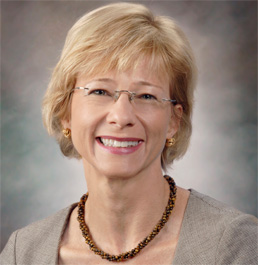 On August 22, 2013, everyone is welcome to attend a special presentation entitled Rethinking Medical Education: Community Service Learning & Community Health, which will be given by Ruth Berggren, M.D., Director, Center for Medical Humanities & Ethics, University of Texas Health Science Center at San Antonio. The program will be held from 12 to 1 p.m. in McDermott Plaza Lecture Hall (Room D1.602), and it is co-sponsored by the Library and the Department of Family & Community Medicine. Lynne Kirk, M.D., Toni and Tim P. Hartman Distinguished Teaching Professor Internal Medicine, University of Texas Southwestern Medical Center, will host the event, and lunch will be provided.
On August 22, 2013, everyone is welcome to attend a special presentation entitled Rethinking Medical Education: Community Service Learning & Community Health, which will be given by Ruth Berggren, M.D., Director, Center for Medical Humanities & Ethics, University of Texas Health Science Center at San Antonio. The program will be held from 12 to 1 p.m. in McDermott Plaza Lecture Hall (Room D1.602), and it is co-sponsored by the Library and the Department of Family & Community Medicine. Lynne Kirk, M.D., Toni and Tim P. Hartman Distinguished Teaching Professor Internal Medicine, University of Texas Southwestern Medical Center, will host the event, and lunch will be provided.
Community service learning (CSL) holds great potential for medical education and for community health promotion and research. At UT Southwestern, the Community Action Research Track (CART) and Community Action Research Experience (CARE) provide students and residents the opportunities to work in underserved communities and to participate in community-based participatory research.
Dr. Berggren will explore current best practices and the future of CSL, which can help students to:
- Address complex problems in complex settings rather than simplified problems in isolation.
- Engage in problem-solving by requiring participants to gain knowledge of the specific context of their service learning activity and community challenges, rather than only to draw upon generalized or abstract knowledge.
- Develop critical thinking: the ability to identify the most important issues within a real-world situation.
- Experience deeper learning because results are immediate and uncontrived. There are no “right answers” in the back of the book.
As a consequence of this immediacy of experience, CSL is more likely to:
- Be personally meaningful to participants
- Generate emotional consequences
- Challenge values as well as ideas
- Support social, emotional, and cognitive learning
Dr. Berggren is also Professor of Internal Medicine and the Marvin Forland, MD, Distinguished Professor in Medical Ethics. Prior to being appointed Director of the Center for Medical Humanities & Ethics, she directed the second-year medical school course on infectious diseases and designed a new elective course — “Poverty, Health, and Disease” — that she continues to direct. Dr. Berggren’s internal medicine training was at Massachusetts General Hospital, followed by a fellowship in infectious diseases at the University of Colorado, where she was a Division of AIDS Fellow funded by the NIH. She then took a faculty position at UT Southwestern, where she pioneered a program for the treatment of Hepatitis C in persons co-infected with HIV. During Hurricane Katrina, Dr. Berggren was the teaching physician assigned to the Infectious Disease ward of New Orleans’ Charity Hospital. She remained at Charity for six days and nights after Katrina struck, working with medical staff to care for critically ill, abandoned patients. After all patients were evacuated from Charity Hospital, Dr. Berggren and her team were rescued by a private jet from Texas. She has subsequently published two articles in the New England Journal of Medicine about this experience and about the impact of hurricane Katrina on health care infrastructure in New Orleans. Dr. Berggren grew up in the Artibonite Valley of central Haiti, just one hour away from Mirebalais, at the Albert Schweitzer Hospital. Following the January 2010 earthquakes in Port au Prince she led relief efforts along the Dominican Republic/Haiti border.
Dr. Kirk is a general internist and geriatrician and has served on several committees relating to the U.S. Medical Licensing Examination (USMLE). She has served on the council of the Society of General Internal Medicine (SGIM). Dr. Kirk was President of the American College of Physicians, the national specialty organization for internists, in 2006-2007. She has published on medical professionalism, faculty development, clinical guidelines, and patient education. She chairs the Internal Medicine Residency Review Committee of the Accreditation Council for Graduate Medical Education and is an Associate Program Director in the internal medicine residency training program at UT Southwestern.
For more information about the forum, please contact John Fullinwider by phone at 214-648-3801 or by email at john.fullinwider@utsouthwestern.edu.
